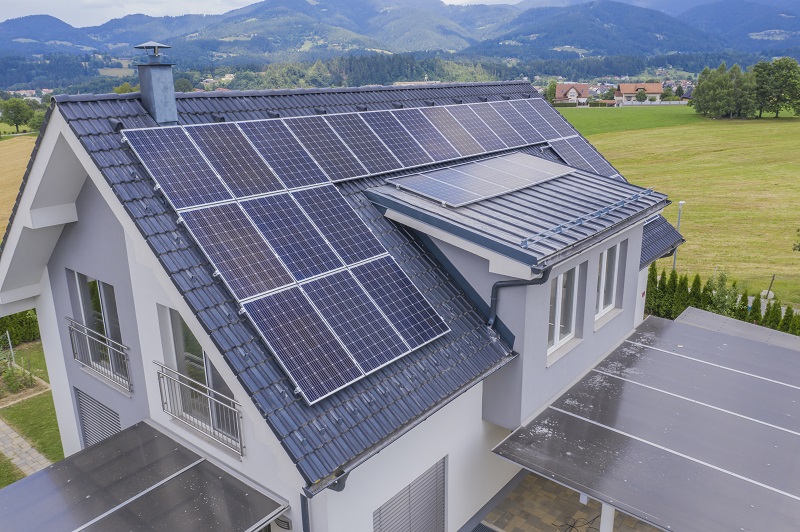
- October 31, 2023
- By Endeavour Electric
- Winnipeg Electricians
Renewable energy, especially solar power, has gained considerable attention lately. In the quest for sustainable alternatives to conventional energy sources, cities such as Winnipeg stand in a unique position to harness the potential of solar power. Nevertheless, addressing the challenges associated with adopting solar power is crucial to fully capitalize on these opportunities. Join us as we explore the potential advantages and disadvantages of embracing solar power in Winnipeg with the expertise of Winnipeg electricians.
Winnipeg’s Substantial Solar Energy Potential
Winnipeg, with its abundance of sunlight throughout the year and high solar irradiance levels, presents a prime opportunity for solar energy generation. The city benefits from a significant solar resource, making it an ideal location to harness renewable energy and reduce reliance on fossil fuels.
One of the key advantages of Winnipeg is its ample availability of suitable rooftops and open spaces for installing solar panels. This provides individuals, businesses, and organizations with the potential to generate their own clean electricity, contributing to both energy efficiency and cost savings. By utilizing these available resources effectively, Winnipeg can take a significant step towards meeting its energy needs in a sustainable manner.
Harnessing solar power in Winnipeg offers several benefits beyond just reducing greenhouse gas emissions. It also provides an opportunity to create local jobs and stimulate economic growth within the renewable energy sector. By embracing solar energy as a viable alternative to traditional sources such as hydroelectric power or fossil fuels, the city can diversify its energy portfolio while ensuring long-term sustainability.
Investing in solar power infrastructure not only helps address environmental concerns but also has the potential to provide stability in electricity costs over time. By relying less on external sources for energy generation, Winnipeg can have greater control over its own resources and reduce vulnerability to fluctuating fuel prices.
Overcoming Weather Challenges: NX Horizon Cold Pak
Innovative Technology for Extreme Cold Temperatures
In Winnipeg, where weather conditions can be harsh and extreme, electricians Winnipeg understand that solar power systems face unique challenges. However, innovative technology has been developed by electricians Winnipeg to overcome these obstacles and ensure the optimal performance and efficiency of solar panels even during the winter months.
The NX Horizon Cold Pak is specifically designed to withstand the cold temperatures that Winnipeg experiences. With its advanced engineering and robust construction, it addresses the maintenance issues typically associated with weather-related problems in solar power systems.
Ensuring Optimal Performance in Winter
One of the key advantages of the NX Horizon Cold Pak is that it prevents snow accumulation on solar panels. This feature ensures that panels continue to generate electricity efficiently by maximizing exposure to sunlight. By reducing snow buildup, this technology minimizes downtime and increases energy production during winter months when sunlight hours are already limited.
Cost-Effective Solution for Harsh Weather
Another benefit of this innovative technology is its ability to reduce maintenance costs associated with weather-related issues. Snow removal from solar panels can be time-consuming and expensive. By preventing snow accumulation, the NX Horizon Cold Pak eliminates or significantly reduces the need for manual cleaning or snow removal services.
Increasing Viability in Cold Climates
With its ability to withstand extreme cold temperatures and optimize performance during winter, the NX Horizon Cold Pak makes solar power systems more viable in cold climates like Winnipeg. It opens up opportunities for homeowners, businesses, and communities to harness renewable energy throughout the year without being hindered by challenging weather conditions.
Increasing PV Shares in Distribution Grids
To meet the growing demand for renewable energy, integrating photovoltaic (PV) systems into existing distribution grids with the expertise of Winnipeg residential electrician presents both opportunities and challenges. By doing so, we can enhance grid reliability and stability through distributed generation, while maximizing the utilization of renewable energy resources within the grid.
Integrating PV Systems
Integrating solar PV systems into distribution grids involves installing and connecting them to the existing infrastructure. This allows for the production of electricity at a local level, reducing transmission losses and enhancing overall grid efficiency.
Enhancing Grid Reliability and Stability
By incorporating distributed generation through PV systems, we can improve grid reliability. Distributed generation means that power is generated closer to where it is consumed, reducing dependence on centralized power plants. This decentralization helps mitigate the risk of blackouts or disruptions in case of failures in one part of the grid.
Maximizing Utilization of Renewable Energy Resources
One major advantage of integrating solar PV systems into distribution grids is the ability to tap into abundant renewable energy resources. Solar power provides a clean and sustainable source of electricity that can be harnessed throughout the day. By harnessing this energy locally, we reduce our reliance on fossil fuels and contribute to a greener future.
Balancing Supply and Demand
Integrating PV systems also helps balance electricity supply and demand within distribution grids. During peak sunlight hours when solar power production is high, excess electricity can be fed back into the grid, reducing strain on traditional power sources. Conversely, during periods of low sunlight or high demand, additional power from other sources can supplement any shortfall in solar generation.
Market Entry Prospects for Solar Power in Canada
With a focus on solar power in Winnipeg, it is crucial to understand the market entry prospects for solar power in Canada, with Winnipeg electrical contractor. The country has been making significant strides towards promoting renewable energy adoption, with favorable government policies playing a key role.
Favorable Government Policies
The Canadian government has implemented various policies and initiatives to encourage the adoption of renewable energy sources like solar power. These policies include:
- Feed-in Tariff (FIT) programs that provide long-term contracts and guaranteed prices for electricity generated from renewable sources.
- Net Metering programs that allow consumers to generate their own electricity and sell excess power back to the grid.
- Renewable Portfolio Standards (RPS) that require a certain percentage of electricity to come from renewable sources.
- Tax incentives and grants for residential, commercial, and industrial sectors investing in solar power systems.
Increasing Public Awareness and Support
Public awareness about climate change and the need for clean energy solutions has been growing steadily. Canadians are becoming more conscious of their carbon footprint, leading to increased support for sustainable alternatives like solar power. This rising demand creates opportunities for businesses entering the solar market.
Growing Market Demand
The demand for sustainable energy solutions is on the rise as individuals, businesses, and communities seek cleaner alternatives to traditional power sources. Solar power offers a reliable and environmentally friendly option that aligns with this growing market demand.
Diverse Range of Incentives
Canada provides a diverse range of incentives at federal, provincial, and municipal levels to promote solar power adoption. These incentives include tax credits, grants, rebates, low-interest loans, and expedited permitting processes. Such incentives make it financially attractive for individuals and organizations to invest in solar installations.
Addressing Challenges to Solar Power Development
Effective Net Metering Policies
To encourage investment in solar power systems, it is crucial for Winnipeg electrician to establish effective net metering policies. These policies allow homeowners and businesses to generate their own electricity using solar panels and feed any excess energy back into the grid. By receiving credits for the surplus energy produced, consumers can offset their electricity bills. Implementing such policies would incentivize individuals and organizations to install solar PV systems, contributing to the growth of solar power generation in Winnipeg.
Mitigating Upfront Costs
One of the primary challenges in adopting solar power is the high upfront costs associated with purchasing and installing solar panels. To overcome this hurdle, financing options or leasing programs should be made available. This would enable homeowners and businesses to access solar power without having to bear the full financial burden upfront. By spreading out payments over time or leasing equipment, more people can afford to invest in solar installations, leading to increased adoption rates.
Strengthening Local Supply Chains
To support the growth of the solar industry in Winnipeg, it is essential to strengthen local supply chains. This means developing a robust network of suppliers and manufacturers who can provide high-quality components needed for solar projects. By sourcing materials locally, it not only reduces transportation costs but also stimulates economic growth within the community. Having a reliable local supply chain ensures quicker access to necessary components and reduces dependency on external sources.
Collaboration between Stakeholders
Overcoming regulatory barriers requires collaboration between various stakeholders involved in the development of solar projects. This includes government bodies, utility companies, industry associations, and community organizations working together towards a common goal: promoting renewable energy sources like solar power. By fostering collaboration and open dialogue among these groups, they can collectively address issues such as permitting processes, interconnection standards, and grid integration challenges.
The Future of Solar Power in Winnipeg and Canada
In conclusion, the future of solar power in Winnipeg and Canada, with electrician Winnipeg, is filled with immense potential and exciting opportunities. With its substantial solar energy potential, Winnipeg has a bright future ahead as it embraces renewable energy sources. Despite the weather challenges that come with living in a colder climate, innovative solutions like the NX Horizon Cold Pak are helping to overcome these obstacles, making solar power a viable option for residents.
As PV shares continue to increase in distribution grids, there is a growing momentum towards integrating solar power into the mainstream energy system. This not only provides environmental benefits but also opens up market entry prospects for solar power in Canada. By addressing challenges such as financing options, policy support, and community engagement, we can further accelerate the development of solar power and create a sustainable energy landscape.
So why wait? Start exploring the possibilities of harnessing solar power for your home or business today. By embracing this clean and renewable energy source, you can reduce your carbon footprint while enjoying long-term cost savings on your electricity bills. Join the movement towards a greener future by taking advantage of the incentives available and investing in solar power solutions that suit your needs.
FAQs
Can I install solar panels on my residential property?
Yes! You can install solar panels on your residential property to generate clean electricity from sunlight. It’s important to consult with a professional installer who can assess your property’s suitability for solar installation and provide guidance on system size, costs, and potential savings.
How much does it cost to install a solar panel system?
The cost of installing a solar panel system varies depending on factors such as system size, equipment quality, installation complexity, and local incentives. On average, residential installations can range from $10,000 to $30,000 before any applicable incentives or rebates.
Are there any government incentives available for installing solar panels?
Yes! In Canada, various federal, provincial, and municipal incentives with electrical contractor Winnipeg are available to support the adoption of solar power. These incentives can include grants, tax credits, feed-in tariffs, and net metering programs. It’s advisable to research and consult with local authorities or solar installers to explore the incentives specific to your region.
How long does it take for a solar panel system to pay for itself?
The payback period for a solar panel system depends on factors such as installation costs, electricity rates, system performance, and available incentives. On average, residential systems can achieve payback within 5 to 10 years. After that point, you can enjoy free or significantly reduced electricity bills for the remaining lifespan of the system.
What maintenance is required for a solar panel system?
Solar panels generally require minimal maintenance. Regular cleaning of dust and debris from the panels is recommended to ensure optimal performance. It’s important to monitor the system’s output periodically and address any issues promptly. Most reputable installers offer warranties and ongoing support to ensure your system operates efficiently throughout its lifespan.
